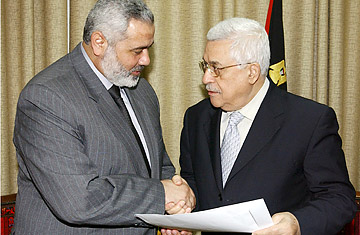
Palestinian Prime Minister Ismail Haniyeh hands over the names of his new cabinet to Palestinian President Mahmoud Abbas in Gaza City, March 15, 2007.
If reaching agreement was a challenge, selling it to an exhausted public and to skeptical members of the international community will be even harder. The Palestinian Legislative Council is expected to ratify the new cabinet in a vote on Saturday. Little else will be so straightforward. The newly designated Interior Minister, Hani Kawasmi, a veteran and unaffiliated civil servant, will have to find a way to take control of the numerous Palestinian security forces and instill some sort of order on the streets. Ziad Abu Amr, the Foreign Minister-designate, and Salam Fayyad, who has been tapped as Finance Minister, are both independent moderates with good reputations in the West. Their job will be to persuade Arab and European governments to lift the financial blockade imposed after Hamas took office a year ago.
The condition for lifting that blockade has been for the new government to accept conditions put forth by the Quartet — Russia, the E.U., the U.N., and the U.S. — which demanded that it recognize the State of Israel, renounce violence, and honor all past agreements. But the new government's platform fudges these questions. It pledges to pursue Palestinian "national unity," to promote transparency and fight corruption, to "end all forms of chaos" and to establish a national security council to oversee internal security. It pledges to "respect" past agreements and also the Saudi peace initiative adopted by the Arab League in 2002 (which offers full recognition of Israel and normalization of relations in exchange for a withdrawal to the Jewish State's 1967 borders, and a "just solution" to the Palestinian refugee issue). But it offers no explicit recognition of Israel. And while it raises the possibility of extending a truce, it does not actually renounce violence — in fact, it explicitly reasserts the right to "resistance" until the Israeli occupation is ended. Not all Palestinians take that as a call to arms, yet it's hardly what Washington and Israel wanted to hear. "This represents a step back," says Israeli Foreign Ministry spokesman Mark Regev. "If there was a hope that the new government would change something, that hope has evaporated."
Hamas is feeling confident, having gotten almost everything it wanted while giving up little in the negotiations with Fatah. But Haniyeh understands that Hamas needs to ease financial hardship in the territories. "We will do what is required of us as Palestinians to unite and reinforce ties with the international community," said the Prime Minister. In an interview with a London-based Arab newspaper, Dr. Ahmed Youssuf, Haniyeh's chief advisor, said Hamas' hard-line ideology could change over time, or at least evolve somewhat. "The political reality is leading to changes in some of the ideas of the movement." Youssuf later told TIME that within Hamas, "We are talking about being more flexible" and working through the political process the organization once shunned. Hamas appears to be playing a delicate game of making only oblique concessions that allow it to maintain credibility on the streets and with its own hard-line militants, some of whom are chafing at the notion of any accommodation with sworn enemies. Youssuf also said the movement might respond positively to the Saudi initiative — a hint, though hardly a promise, of implicitly recognizing Israel.
And if Hamas is trying to soften its image, its erstwhile adversaries in Fatah are endorsing the effort: "We call on all parties, including the Arabs, to work and live with this government and to give it an opportunity," said Abbas aide Nabil Abu Rudeineh. The aim seems to be to break up the united front of the Quartet, persuading the Europeans and the U.N. to begin working with the government — probably through non-Hamas ministers — while the Saudis and Egyptians, mindful of the need to prevent Iran from becoming the main patron of the Palestinian cause, would offer financial and diplomatic support and persaude the U.S. to change its position. The text of the platform thanks Saudi Arabia, Egypt and the E.U. for its support — Syria as well — and hopes for better relations with China, Japan, and Russia. (It also "calls on the United States administration to reconsider its unjust positions towards the Palestinian cause.") In response, Regev, the Israel's Foreign Ministry spokesman, asks the international community "to stand steadfastly on its principles," not to waver or be taken in by what Israel sees as false promises and half-measures.
While the new government and its platform are unlikely to sway the U.S. and Israel, it may yet gain traction because of doubts among other stakeholders that continuing the blockade will yield a positive result. And the fact that it comes tied to a renewed Saudi-led Arab peace process, one which both the U.S. and Israel have pondered exploring further, may raise the temptation to engage the new Palestinian government, imperfect as it may be, and closely monitor its behavior and its evolution.
